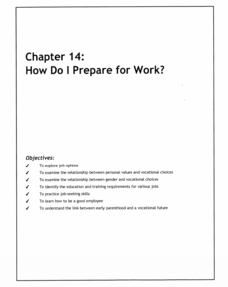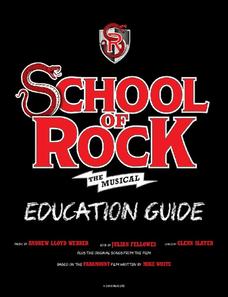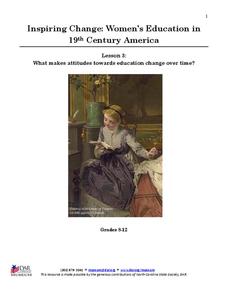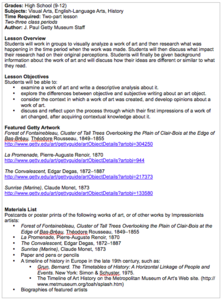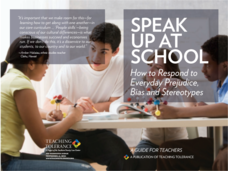Advocates for Youth
How Do I Prepare for Work?
You got your class through their teenage years—now it's time for the real world! Class members focus on the how-to of preparing for work, including job interview skills, resume workshops, and
Advocates for Youth
What Reduces Sexual Risks?
Teens don't have the ability to see around all of the corners of their decisions, some of which can affect the rest of their lives. Help them understand the implications of risky sexual behavior, including sexually transmitted diseases...
Advocates for Youth
How Can I Take Care of My Health?
Life is all about choices, and a healthy life tends to involve a lot of healthy choices. Guide teenagers toward a life full of nutritious food, regular exercise, and responsible decisions with a series of lessons on healthy habits for...
Advocates for Youth
Can I Keep Violence out of My Life?
Many teenagers in your class have not experienced violence in their lives, much less as a daily occurance. But some pupils are not so lucky. Bring hope to your class that violence is not an inevitable part of life, and that they can...
Henry Ford Museum
Sustainability: Environmental Management and Responsible Manufacturing
When you think about environmental sustainability, the Ford Motor Company probably isn't the first company to come to mind. A four-lesson unit introduces learners to the idea of sustainability and environmental stewardship. It describes...
iTheatrics and Broadway
School of Rock the Musical: Education Guide
That old fashioned rock and roll comes alive as theatre arts students prepare to attend a live performance of the musical School of Rock. Packed with both pre- and post-production materials, the guide has it all. Rock on!
National Society Daughters of the American Revolution
Lesson 3: What Makes Attitudes Towards Education Change over Time?
The struggle for women's rights is not unique to this generation, or even to the 20th century. Class members explore the conflicting opinions of Alexander Graham Bell and his wife, Mabel Hubbard Bell, regarding women's pursuits of higher...
Daughters of the American Revolution
Lesson 2: How Do We Determine the Value of Education?
Have women always had the same educational opportunities as their male counterparts? Young historians read an 1819 essay by Emma Willard on the state of female education in the 19th century before discussing their views regarding women's...
Daughters of the American Revolution
Lesson 1: How Do Society’s Expectations Influence Education?
The history of women's education can be traced back to the delicate stitching of student samplers from the 19th century. Modern-day pupils examine and analyze four primary sources, three of which are images of embroidered samplers, which...
PBS
Lessons in Leadership, Roosevelt Style
It's easy to criticize those in power until you're sitting at their desk, faced with the same decisions. A history lesson plan prompts secondary learners to research the Roosevelt presidencies through the lens of leadership and...
Library of Congress
Thomas Jefferson's Library: Making the Case for a National Library
The United States Library of Congress, the largest library in the world. But such was not always the case. The library was destroyed during the War of 1812. In a persuasive letter to Samuel H. Smith, Thomas Jefferson offered to sell his...
PBS
Evolution of the Presidency: Theodore Roosevelt to Franklin D. Roosevelt
How much power should a president be allowed to exert? Theodore Roosevelt and Franklin D. Roosevelt exercised their power according to their interpretations of the United States Constitution, and these interpretations affected the...
Global Oneness Project
The Nature of Happiness
The U.S. Constitution states that the pursuit of happiness is an inalienable right. The United Nations' Global Happiness Index ranks countries according to the happiness of its citizens. As part of a discussion of the nature of...
What So Proudly We Hail
A Lesson on Benjamin Franklin’s “Project for Moral Perfection”
Benjamin Franklin identified 13 virtues that he felt would strengthen his character if he could focus on each one. A thorough lesson plan explores high schoolers' personal values in the context of their lives, and compels them to strive...
Administrative Office of the US Courts
Elonis v. U.S.
With the explosion of social media sites, with online threats and cyber bullying, issues of freedom of speech have taken on a whole new aspect. Elonis v. U.S. represents the first time the Supreme Court has considered whether or not...
ReadWriteThink
Analyzing Famous Speeches as Arguments
A speaker, a message, an audience. After analyzing these elements in Queen Elizabeth's speech to the troops at Tilbury, groups analyze how other speakers use an awareness of events, and their audience to craft their arguments....
J. Paul Getty Trust
Shaping Ideas: Symbolism in Sculpture—Lesson 3
The final session in a sequential, three-lesson sculpture study designed by the education staff of the J. Paul Getty Museum in Los Angeles has class members using the criterial they developed to critique each others' symbolic sculptures.
J. Paul Getty Trust
O Greek Shape! O Fair Pose!
Everything old is new again. The Los Angeles J. Paul Getty Museum presents a lesson on how Greek black-figure painting influenced eighteenth century Neoclassical artists. After looking at a series of examples, class members create their...
J. Paul Getty Trust
Historical Context: Discovering a Painting
Class members are presented with the image of a painting and asked to record their first impressions and analysis. They then research the time period in which it was painted and discuss how their research impacted their first impression...
J. Paul Getty Trust
Looking and Learning in the Art Museum — Lesson 2
Is there a difference between examining an original work of art and viewing a reproduction? Class members are asked to reflect on this question after researching a piece, study a reproduction of it, and the examining the original in an...
J. Paul Getty Trust
Looking and Learning in the Art Museum — Lesson 3
Curator, artist, art handler, archivist, conservator-restorer, guide. Who would have thought there were so many different kinds of museum professionals? After a visit to an art museum, class members reflect on the role of the museum in...
Southern Poverty Law Center
Speak Up at School
When someone says something offensive based on prejudice or a stereotype, it's often difficult to know how to react. A packet on tolerance and standing up for others guides teachers to both learn and instruct members of their class to...
J. Paul Getty Trust
Picturing a Story: Photo Essay about a Community, Event or Issue
Picture this. Class members follow in the footsteps of W. Eugene Smith, Dorothea Lange, James Nachtwey, and Lewis Hine by creating their own photo essay about a local event or issue.
PBS
Stories of Painkiller Addiction: Commitment to Recovery
Recovery from substance addiction is an ongoing process. The final lesson plan in a series about painkiller abuse and addiction prompts learners to research various recovery options before writing a short story about a character who is...


